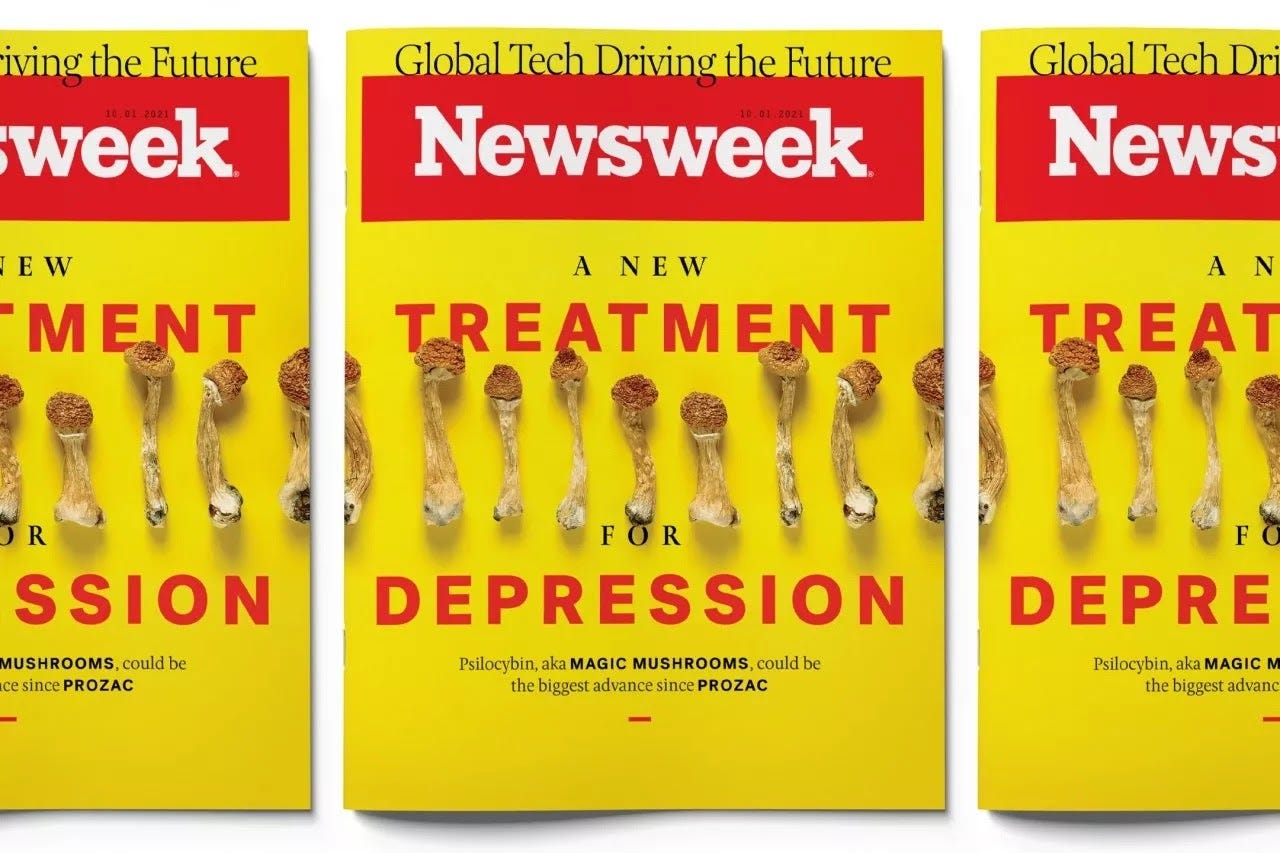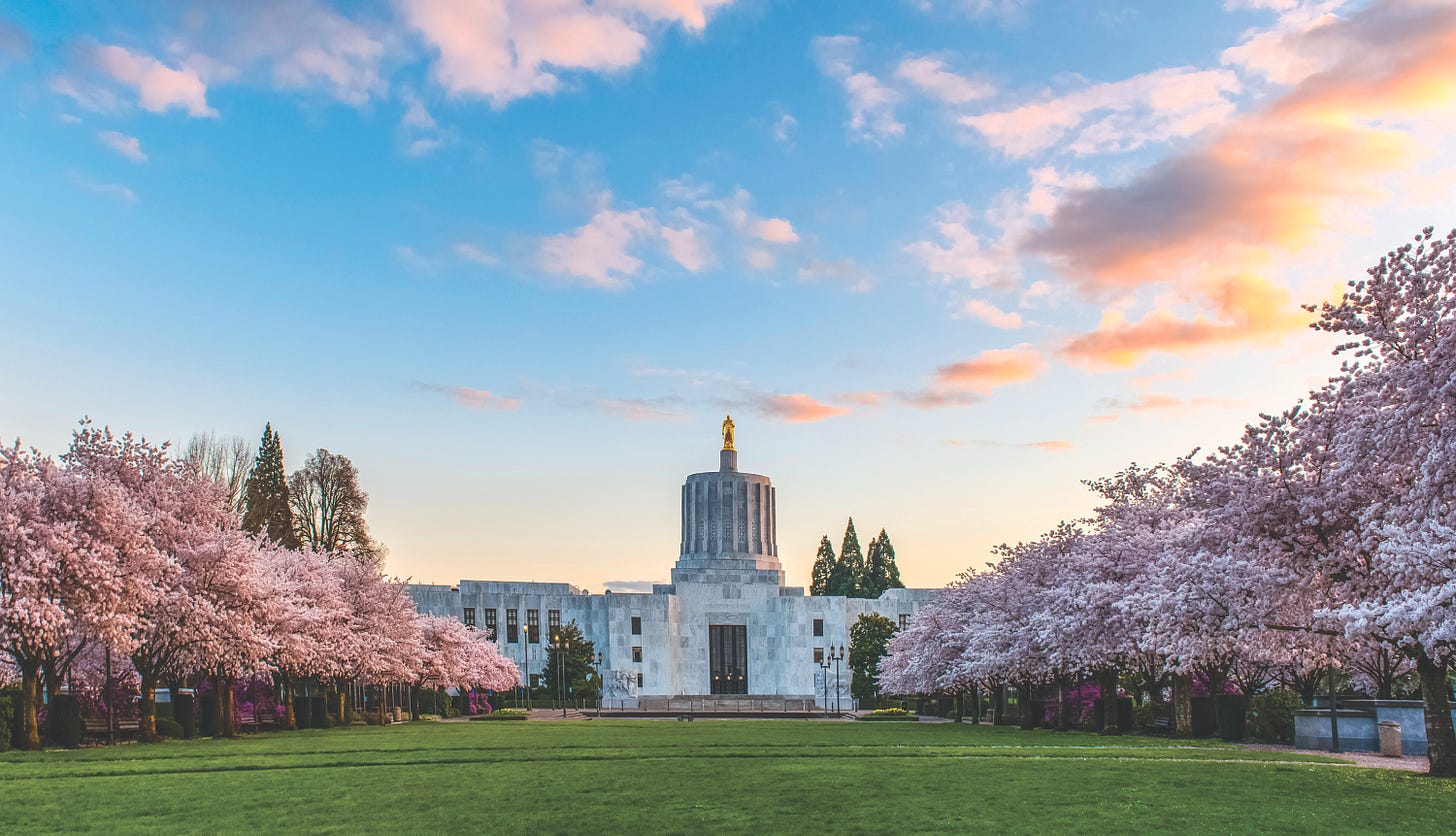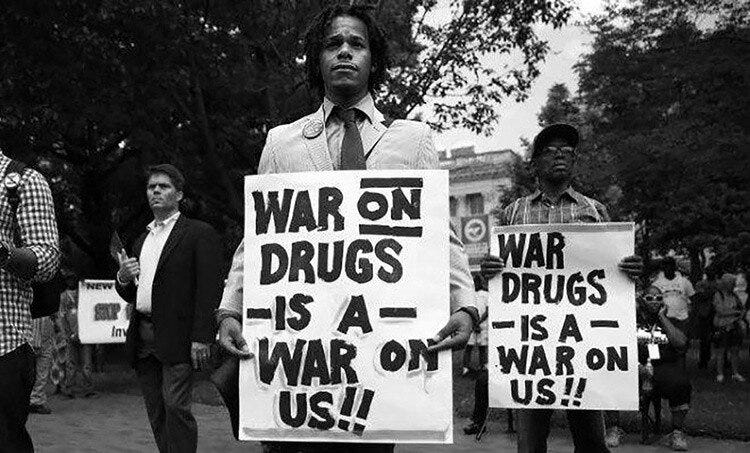Oregon: The Global Center for Psychedelic Therapy
And with changing minds remolding culture, a massive shift of the Overton window may be underway.
The world — and specifically the innovative and inspiring state of Oregon — is in the midst of a profound psychedelic renaissance.
The work of responsibly reintegrating these incredibly powerful plants, fungi, and molecules back into society is being done by thousands of people across a wide variety disciplines.
Studies of psilocybin mushrooms, MDMA, ketamine, and other psychedelics have consistently shown tremendous potential for therapeutic applications. Seemingly every other week a landmark study is released, and another cover story in a major publication is printed, demonstrating how these molecules help people.
In increasing numbers, people are turning to psychedelics to overcome anxiety, unresolved trauma, eating disorders, and bad habits; as well as to increase their creativity, joy, and general wellbeing. In contrast to the pharmaceuticals presently filling that role, psychedelics are organic, non-toxic, non-addictive compounds.
With Oregon’s recent passage of Ballot Measure 109, which legalized psilocybin-assisted therapy, our slice of the world has once again found itself as a focal point in an important aspect of humanity similar to Oregon’s pioneering efforts in environmentalism, healthcare, city planning, and other fields.
As Ezra Klein of the New York Times put it recently, ‘A very promising mental health experiment is taking shape in Oregon’.
This paradigm shift is exciting. Sometimes too exciting.
So before I get into it, allow me to share a note to anchor us in some recent history.
A crucial preamble
I find it helpful and grounding to be reminded often of the fact that we’re in a renaissance—a rebirth—because despite millennia of use these fungi, plants, and compounds were outlawed by politicians in the 1960’s and 1970’s. And the people that had a relationship with these plants were consequently oppressed.
This is according to a plain reading of the history of the “war on drugs.” Even one of Richard Nixon’s top advisers, a key figure in the Watergate scandal and drug war, said on the record that “the war on drugs was created as a political tool to fight blacks and hippies.”
So, oppression and suppression were the goals of criminalization—not health and wellbeing, not public safety. Criminalization of psychedelics was not based on science. In fact, decades of federally funded and university-led research showed the remarkable promise of these medicines.
Due to xenophobia and racism, and to politicians’ fears that a citizenry, illuminated and unconditioned by the power of psychedelics, would do things like protest the American-led War in Vietnam and begin wondering if the logic of markets had infiltrated too many aspects of our lives.
This is to say—a revival is only needed if there’s been a downturn.
And the downturn of psychedelics has been inextricably tied to the horrendous and colossal failure that has been the drug war. This war was born of racism and anti-science which has emboldened systemic racism, devastated millions of people’s lives and spurred the prison industrial complex that we have today.
It can be uncomfortable and unnerving to be reminded of—or to learn of—this history.
But without this history informing where we go from here, we run the risk of missing the urgency and importance of centering restorative justice, in addition to health and safety, into the psychedelic renaissance.
We also run the risk of engaging in what some have called ‘psychedelic exceptionalism’; a fair critique of the psychedelic community for sometimes operating in a way that leaves behind those most impacted by the “war on drugs.”
For these reasons, let’s not forget our recent history and the need for centering justice as we forge on.
A new era for healthcare — and for being a human
“Try refreshing again!”, someone shouted gently as we huddled around the projector on the chilly and unusually dry evening of November 3, 2020.
The Oregon Secretary of State’s election outcomes website was projected onto a screen outside in the backyard of Tom and Sheri Eckert’s home. The pair had spent the better part of a decade traveling around the state and country discussing and building what had become Oregon Ballot Measure 109.
Now they were hosting the election night party for their baby, who had a companion in Oregon Ballot Measure 110.

We stood around outside under a tent, in case it rained, in excitement and heavy nervousness, refreshing election results.
We couldn't wait to see what Oregonians thought. We knew the rest of the world was watching Oregon, too.
In October 2020, I wrote about what might be in store for Oregon should the duo of measures advance: “With this measure, along with Measure 110, the Beaver State is on the precipice of landmark and world-leading changes in the way we approach criminal justice and drug policies. The outcome of these two measures will determine whether or not Oregon will be on the very forefront of these issues not just in the United States, but worldwide.”
That dry evening, both measures passed by a slam dunk margin. Quite the opposite of what many had predicted, including myself at various times in the years and months leading up to election night.
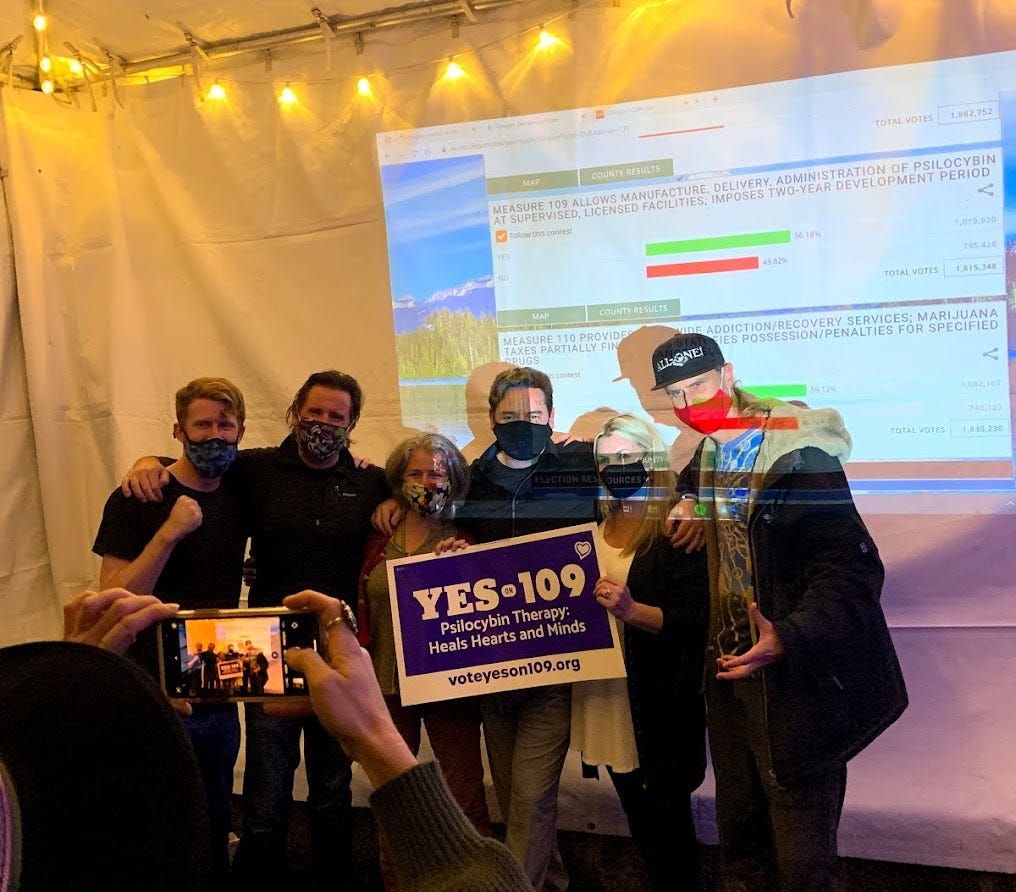
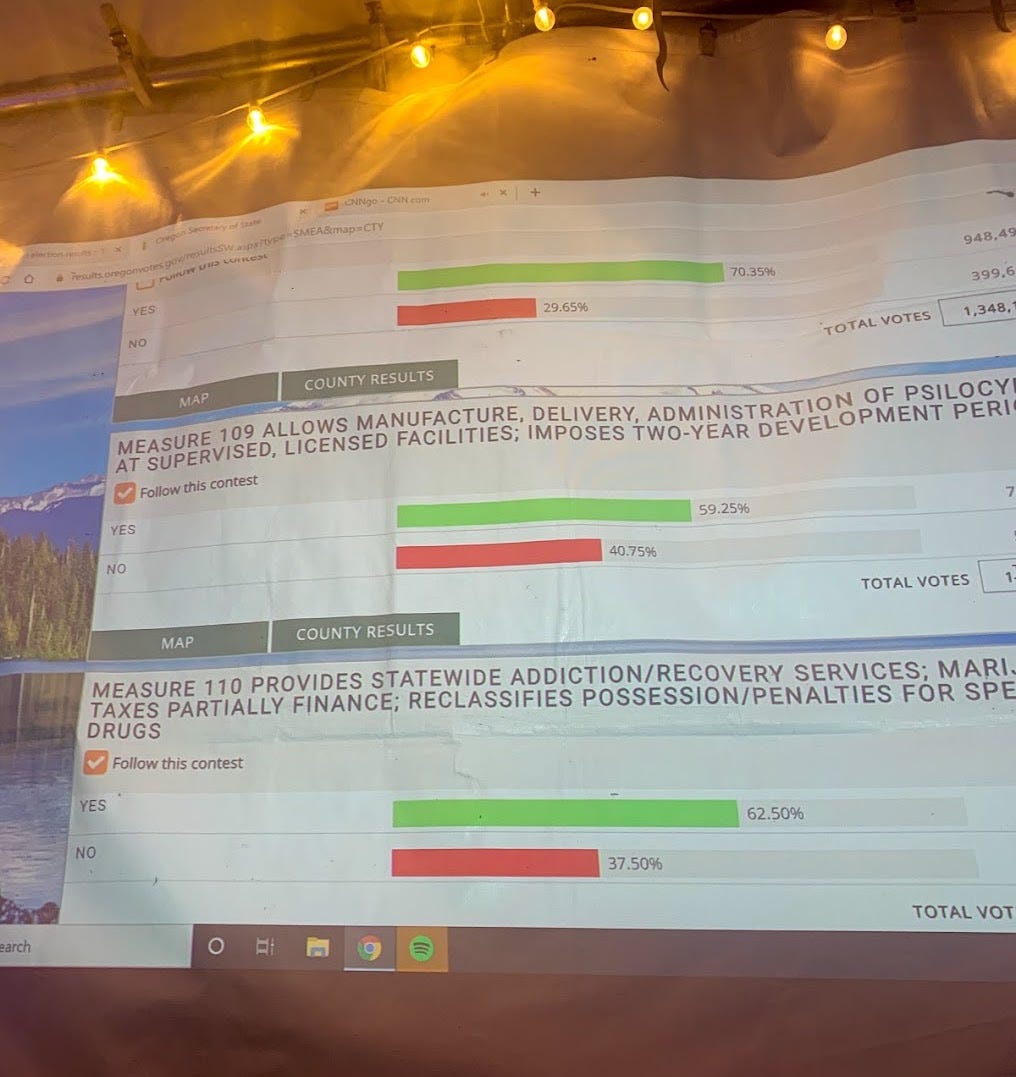
Oregon embraced ending the failed “war on drugs,” accepted the psychedelic renaissance, and legalized psilocybin assisted therapy.
Just like that, we became the tip of the spear worldwide for progressive, science-driven drug policy. And likely catalyzed a new era in healthcare.
Research shows trauma tangles the brain, psychedelics untangle it. So... let’s legalize psychedelic therapy?
A year and change prior to election night, I had reached out to Sheri and Tom after my life changing experience with psilocybin mushrooms.
It wasn’t until after that experience that it became painfully clear I was living with unprocessed trauma—thought loops that were largely unconscious and often drove my habits and motivations. It was a haunting yet common revelation.
Home life growing up in East Portland was often tough. When I was young and trying to make sense of the world, I became obsessed with the built environment. While I didn’t really know what it meant, I told myself and others I wanted to become an architect.
My form of rebellion in high school became bucking a trend around me and deciding I would graduate high school. Even more, I’d go to college. I was a terrible high school student and my grades resulted in rejections from every college I applied to. After writing a ridiculous letter to the University of Oregon asking them to reconsider my rejection, they accepted me.
As I learned about systems issues freshman year, from our broken yet somehow intentional industrial food system that created a diabetes and obesity epidemic to the many forms of systemic racism and its horrific consequences, my interests expanded. From the built world it expanded to city planning and then to advocacy and activism, and finally to shifting the levers of power via electoral politics and policymaking, which in turn shape the rules we live by and determine what’s “politically feasible.” Wonks call that the Overton window.

I’m now a firm believer that culture—not architecture or city planning or politics - is the most powerful determinant of what does or doesn’t happen. Whether or not we live in a world with resource hoarding, income inequity, and systemic injustices.
Culture and imagination appear to be the bedrock that determines what outcomes are deemed “politically feasible.”
Nothing from my vantage point expands imagination, gives rise to empathy, and refocuses our outlook towards the underpinnings of humanity quite like a respectful relationship with psychedelics.
After deep burn-out from consecutive jobs in the Oregon Legislature, helping run political campaigns and a nonprofit, and a broken and toxic Portland City Hall, along with the sudden loss of my oldest brother and several of my closest friends, my mind had some gnarly tangles.
Consuming a moderate amount of psilocybin mushrooms, taken under a specific set and setting, catapulted me into a process of beginning to untangle my brain from the unprocessed trauma I had piled up.

That initial psilocybin therapy experience, and the clarity that resulted from it, remains one of the most important experiences of my life.
And it remains the primary reason I wanted to help the psychedelics movement however I could.
The next day after my journey I asked myself, “How could I help those in my life experience similar healing?”
I remembered hearing about a therapist couple - Tom and Sheri Eckert - endeavoring to legalize psilocybin assisted therapy. I tracked down their phone number and called to see if I could help them out while driving between work appointments. Tom Eckert answered the phone.
He recently recounted our initial conversation to a friend while we were hanging out: “This guy Nate called, started talking, and was making sense.” Through 2019 and 2020 I volunteered as an advisor to what became Measure 109.
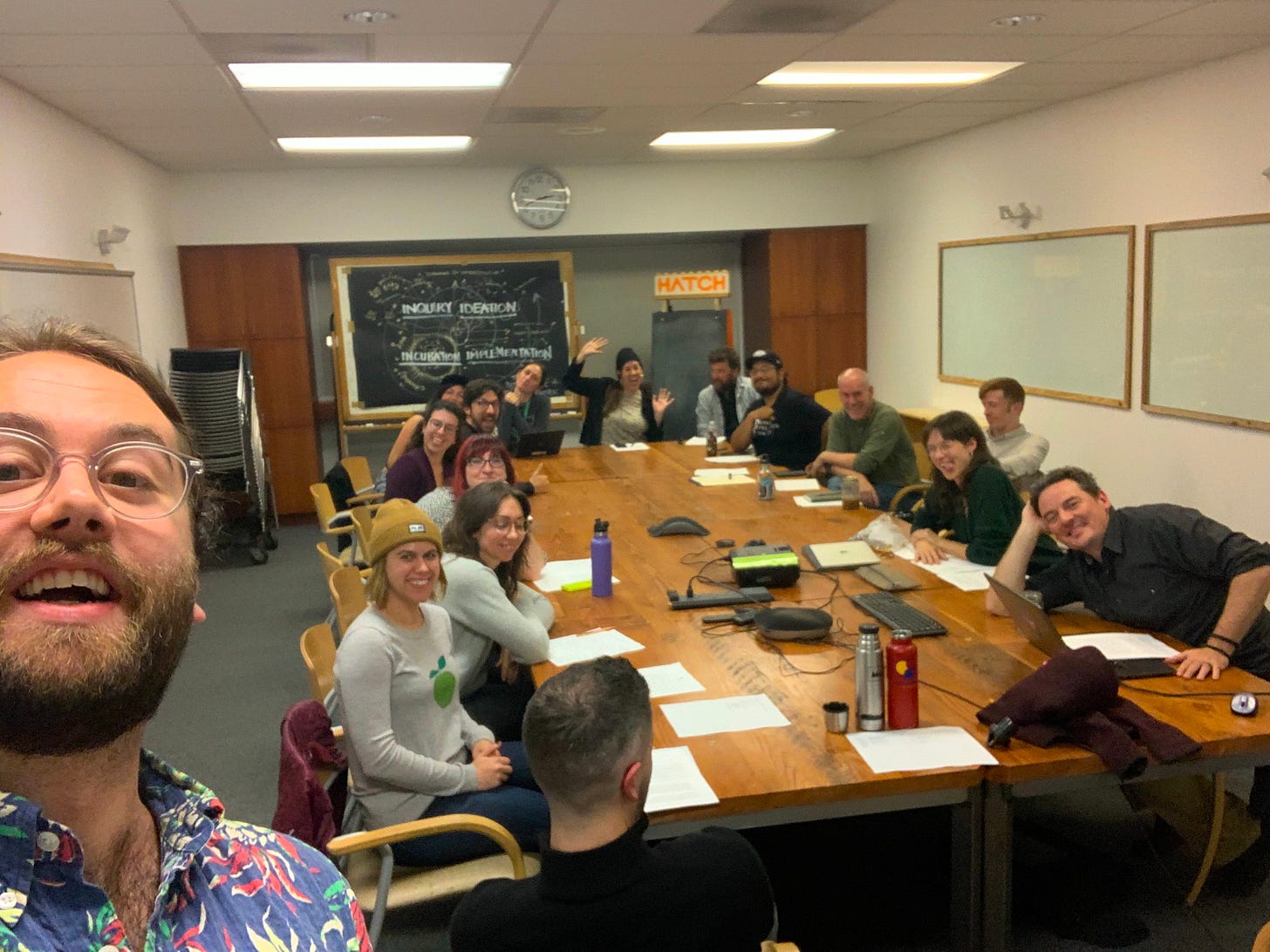

What’s in store for 2022, 2023, and beyond. Helping see through the vision of Measure 109.
In July 2021, I left the day-to-day of my family company and farm, East Fork Cultivars, and joined my now-good-friend Tom Eckert full time to help see through the vision of the Measure 109 movement.
As the measure’s architect and now Chair of the Governor-appointed Psilocybin Advisory Board, Tom, and the late Sheri, shared a vision for what might come next after winning at the ballot.
That vision has culminated in a trio of organizations that we’re building together: the Sheri Eckert Foundation, InnerTrek, and the Psychedelic Therapy Association.
These three organizations embody three pillars to help see through the responsible reintegration of psychedelics into society to increase healing: access, training, and support.
Access - The Sheri Eckert Foundation: creating equitable opportunity, representation, and access within Oregon's psilocybin therapy framework

Just over 1 year ago, we sailed into a historic election night victory with the passage of Ballot Measure 109.
A month and a half later, we lost Measure 109’s heroic co-creator, Sheri Eckert.
We forge on in her honor, as the Oregon Health Authority and its Governor-appointed Advisory Board develops the statewide program. Meanwhile, the nationwide movement only gets stronger.
With the Psilocybin Advisory Board now advancing recommendations regarding Psilocybin Facilitator Training Programs, the path to licensure is becoming clearer.
In May of 2022, the OHA will begin approving programs to ready students for licensing.
In 2023, licenses will be issued to practitioners who have successfully completed the approved training and passed a state licensing exam.
As we wait for OHA approvals, people around the state are building quality training programs to create the first cohort of State-licensed psilocybin practitioners.
The Sheri Eckert Foundation (SEF) will honor the legacy of Oregon Ballot Measure 109’s co-creator and fulfill one of her clearly stated intentions: supporting “equitable access to psychedelic education and services.”
Sheri Eckert, who passed away in December of 2020, spoke of creating an institution that, “guided by on-the-ground community leaders, would allocate resources to support facilitator training, community education, and service delivery for often underserved populations.”
SEF’s first effort comes in support of advancing a diverse body of students working toward licensure as psilocybin practitioners in the state of Oregon.
Head to sherieckert.org to learn more, submit a scholarship interest form, or donate.
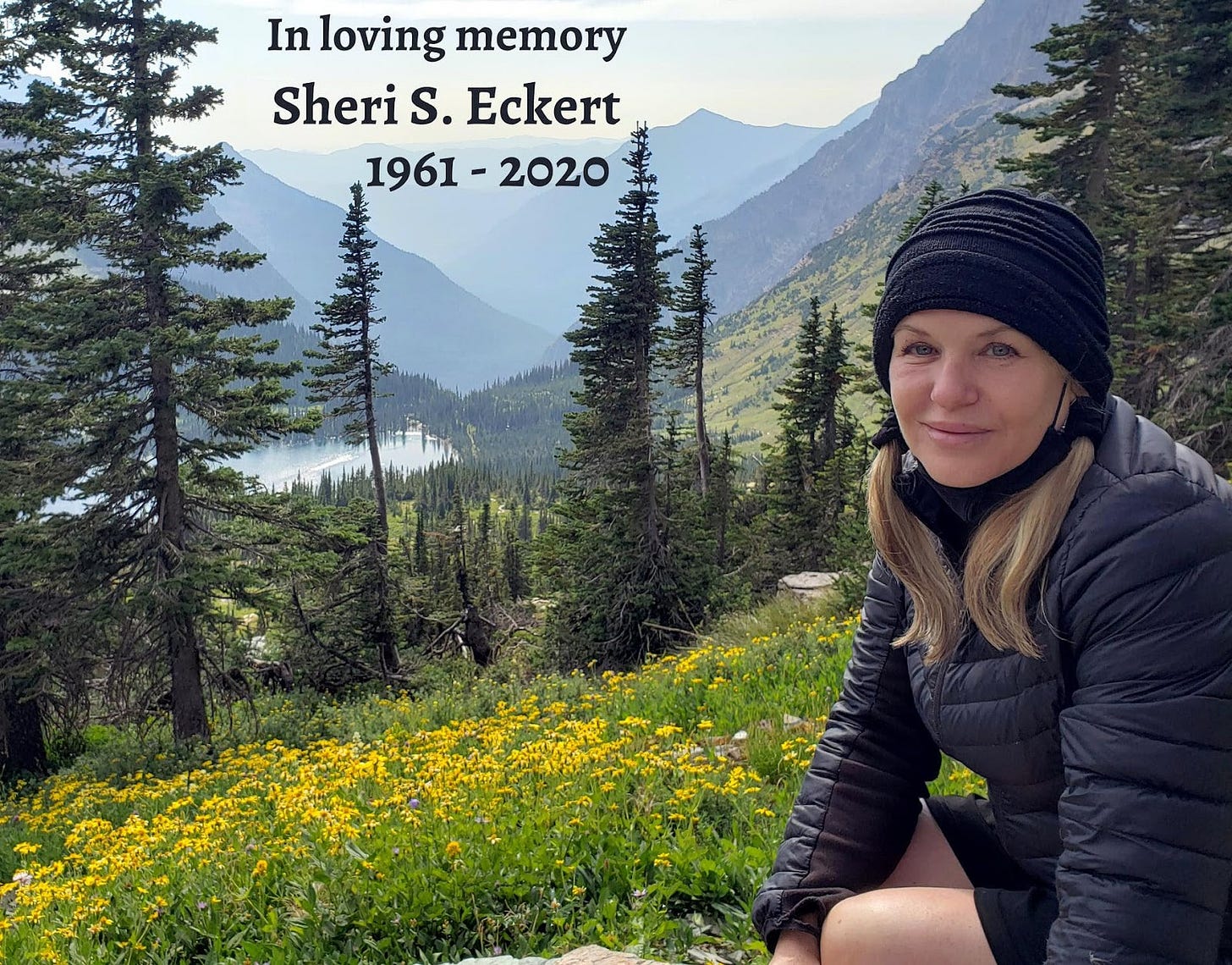
The objective of SEF is to grant scholarships to qualified student applicants who might not otherwise have resources or opportunities to access the intensive training required for psilocybin licensure. Scholarships can be applied to any participating state-approved training program.
In this way, SEF begins its mission to ensure that the evolving psychedelic ecosystem is populated by professionals and clients from diverse backgrounds, financial means, and geographies around the state.
SEF is especially inspired to help ensure that traditionally underrepresented populations have equal opportunities to get involved and to feel supported as the Psilocybin Services Program rolls out across Oregon.
Training - InnerTrek: Quality psilocybin facilitator training will be key to the success of the statewide program

Phase one of the grand plan began with leading a movement to legalize psilocybin services in Oregon. Phase two involves implementing quality and accessible facilitator training.
InnerTrek, our evolving Psilocybin Facilitator Training Program serving the Portland area, is poised to produce a first wave of facilitators in Oregon. The organization is led by Tom, myself, and an esteemed group of educators.

Incorporating a blend of teaching methods and perspectives, within robust online and in-person learning environments, InnerTrek will deliver a comprehensive curriculum aimed at equipping students with the knowledge and skills needed to pass the state licensing exam and launch successful careers as licensed psilocybin facilitators.
I’d like to note that Tom and Sheri’s previous joint therapy practice, focused on combating intimate partner and family violence, was called InnerWork.
If you know someone who would like to become a Licensed Psilocybin Service Facilitator, we’re currently accepting pre-applications here.
Or know someone interested in joining InnerTrek’s team of educators, or have suggestions? Head to InnerTrek's Our Team page and fill out the form at the bottom of the page.
Support - The Psychedelic Therapy Association: a professional trade association supporting the Oregon Model of psychedelic care

We’ve also been busy blueprinting and identifying potential collaborators in an evolving effort to create the Psychedelic Therapy Association (PTA).
PTA is a new nonprofit, member-driven professional association designed to democratize, organize, and energize the evolving psychedelic ecosystem, starting here in Oregon.
Serving as a unifying voice for an evolving profession, PTA will draw initial membership from Oregon’s emerging pool of licensed professional facilitators, services centers, and product manufacturers.
Completing the Policy Picture - getting back to where we once were
With so much of the psychedelic renaissance and movement, we are simply getting back to where we once were.
We’re cultivating a society that once again might view and consume the plants and fungi around us without fear of imprisonment. And without the distorted political conditioning that was created with the express purpose of controlling people and amassing resources.
We are nearing a relationship with plant medicines rooted in humility and a desire to better ourselves and others, informed by experience and science instead of lore and propaganda.
To this end, Ballot Measures 109 and 110 are important pieces of a larger picture that’s beginning to take shape.
Another essential piece to this policy picture is the full decriminalization of plants and fungi medicines for use outside of government sanctioned programming.
This is where the Plant Medicine Healing Alliance (PMHA) comes in.
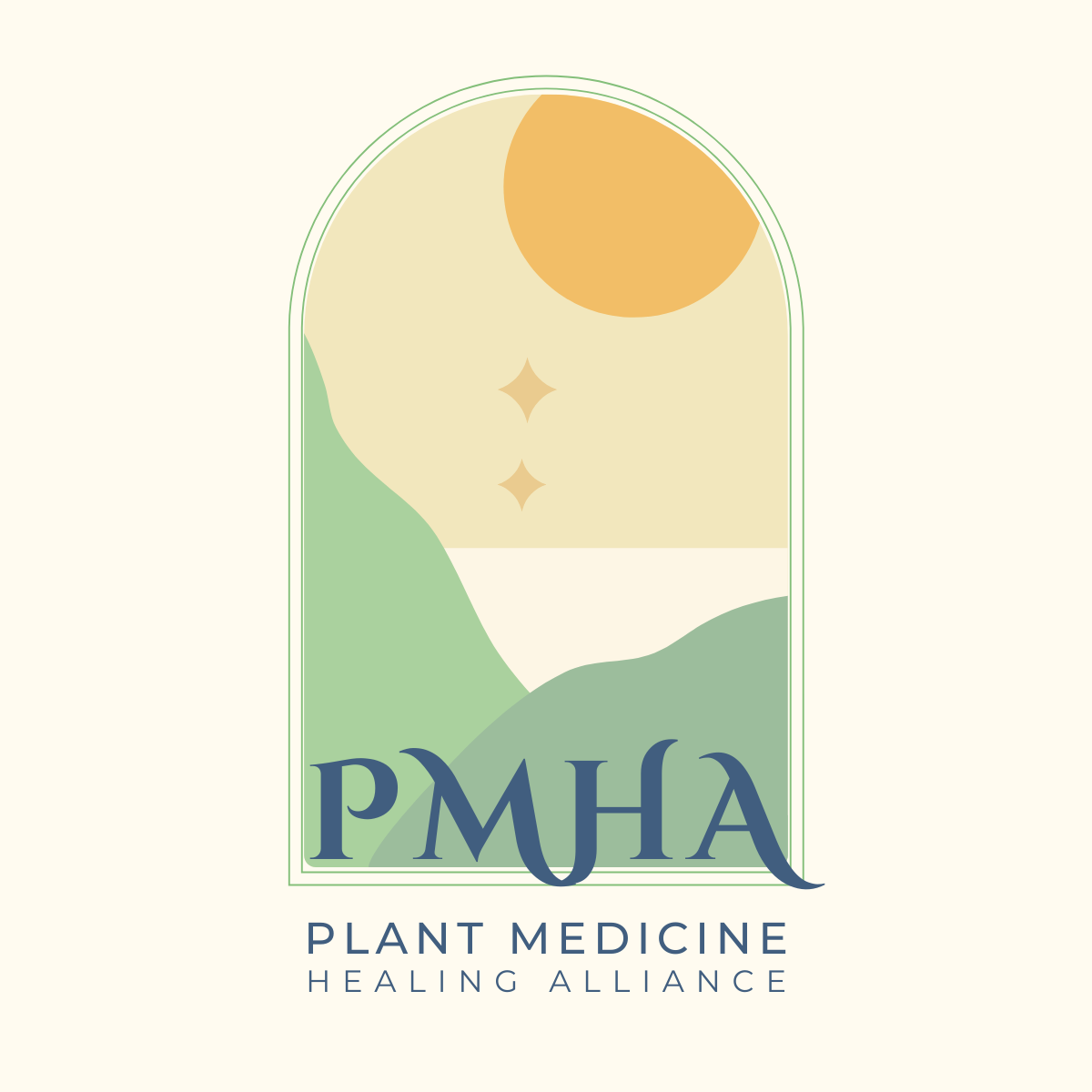
For about a year now, I’ve had the true honor of being trusted by this group - a remarkable 23-member Board of Advisors - to help facilitate our work.
The Alliance’s mission is to decriminalize fungi and plant medicines for home growing, group healing, and ceremonial and religious purposes.
Working initially in Portland, in partnership with indigenous stakeholders among others, we aim to enact this policy while promoting sustainable sourcing and honoring the human, plant and animal ecologies where the medicines grow in mutual care.
Our proposed policy resolution for Portland City Council, which was drafted by dozens of experts over several months, can be found here.
Our Alliance has been working nonstop throughout 2021 to help complete the policy picture emerging in Oregon.
This work has been highly collaborative, non-hierarchal, and continues with weekly meetings, recurring work sessions, and nearly two dozen conversations with staff from all five Portland City Councilors as well as the City’s Office of Government Relations and Tribal Relations Program.
The occasional social gathering with music from our talented PMHA Board Members is also essential.


We’ve also helped organize essential forums and increase knowledge and respect around peyote and the Native American Church’s (NAC) request to not include their sacred medicine in decriminalization policies, given that peyote is trending towards extinction.
Alliance Board Members have served in pivotal roles advancing other landmark policies like the major decriminalization policy in California’s Assembly, California Senate Bill 519, in addition to passing thoughtful decriminalization measures in cities around the country, including our neighbors to the north Seattle City Council’s unanimous 9-0 vote in October 2021 to decriminalize entheogens.

Stay tuned
There’s much I’ve left out in this post. I plan to write more in the coming months, and years, on this issue and these projects.
In the meantime, here’s my parting thoughts.
I believe we should be working towards healing trauma with the safe, effective use of psychedelics. And the ability to find this healing, and the work to create an environment where we can engage with plant medicines, is well underway. We’re now swiftly moving beyond the myths of the last 65 years.
I believe a good life is found through being in service of others, being kind, and finding what sparks joy.
And all of this is embodied for me by working to increase access to thoughtful relationships with psychedelics.
If you’d like updates on any of these endeavors, sign up for our email newsletters on each of the sites I’ve linked to above, follow our social media accounts, or drop me a line at nathancolehoward@gmail.com.
And if you’ve read all of this, thank you!! I’m grateful for you and would love to hear from you over email.
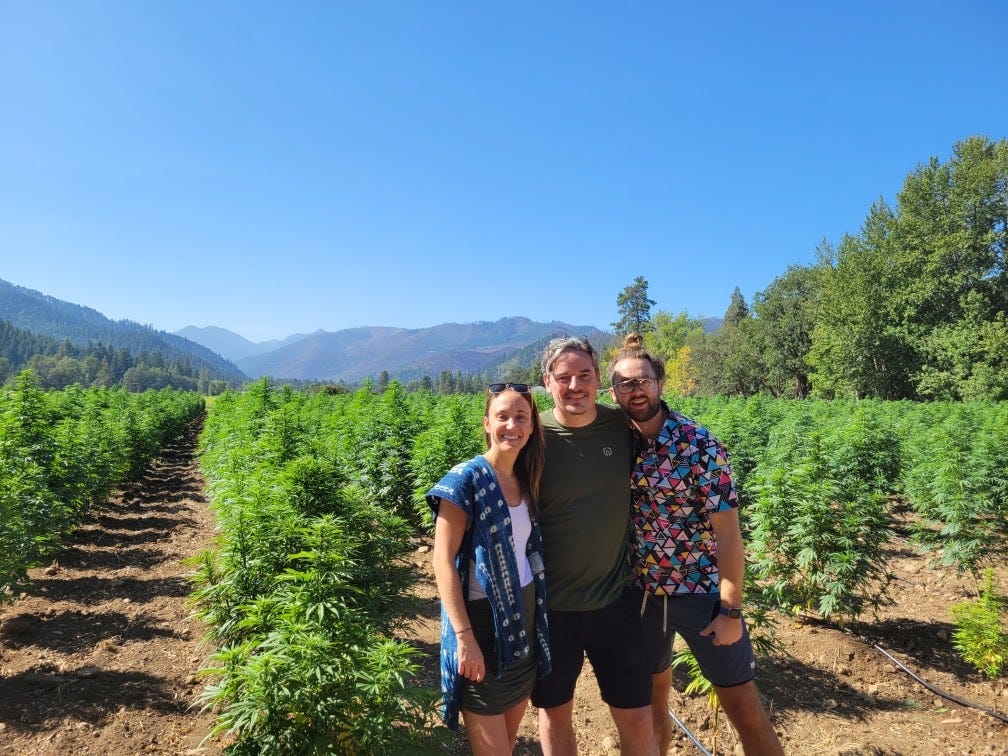
Cofounder & President at East Fork Cultivars. Project Manager at Sheri Eckert Foundation, InnerTrek, Psychedelic Therapy Association, and Oregon Psilocybin Society. Facilitator at Plant Medicine Healing Alliance. Advisor to various political campaigns and candidates. Board of Directors at various Oregon-based organizations.
RELATED PIECES




